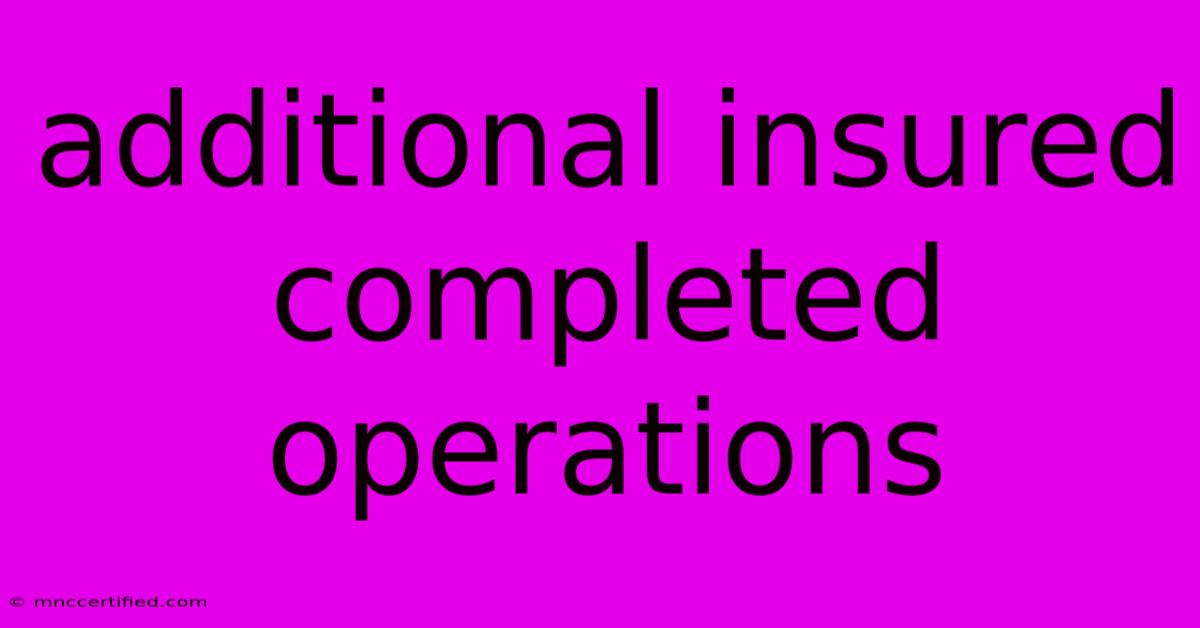Additional Insured Completed Operations

Table of Contents
Additional Insured: Completed Operations Coverage - Understanding Your Protection
In the world of construction and contracting, protecting yourself and your business is paramount. One crucial aspect of this protection is understanding additional insured coverage, especially when it comes to completed operations. This article dives deep into this often-overlooked but vital insurance concept, explaining what it means, why it's important, and how it can safeguard your business.
What is Additional Insured Coverage?
Imagine this: you're a contractor hired to install a new roof on a commercial building. After the project is finished, a worker falls from the roof while performing routine maintenance, causing injury and significant costs. In this scenario, the building owner might sue you, even though the accident occurred after your work was complete. This is where additional insured coverage comes into play.
Additional insured coverage is an endorsement added to a liability insurance policy. It extends coverage to a named third party, such as a building owner or project manager, for incidents that arise from the insured's work, even after the work is completed.
Why is Completed Operations Coverage Important?
Completed operations coverage, a specific type of additional insured coverage, is crucial because it protects you from liability arising from your work after the project is finished. This coverage extends to situations where:
- Defects in your work lead to injury or damage.
- Products you supplied cause harm after installation.
- Your work creates a hazardous condition that leads to an accident.
Essentially, completed operations coverage ensures that you're covered even when your direct involvement in the project is over.
Understanding the Benefits of Completed Operations Coverage
Having completed operations coverage offers several benefits:
- Protection against liability: This coverage protects you from financial ruin if you're sued for an incident caused by your work, even after its completion.
- Peace of mind: Knowing you have coverage for completed projects can alleviate stress and give you confidence in your business operations.
- Improved business relationships: Showing your clients that you carry completed operations coverage demonstrates your commitment to their safety and well-being, fostering trust and building strong business relationships.
Getting Additional Insured Coverage
The process of obtaining completed operations coverage is straightforward. You can request this endorsement when initially purchasing your liability insurance policy or add it later.
Important note: Ensure you understand the specific coverage provided by your insurance provider. Some policies might only offer limited coverage, while others might have broader protection.
Tips for Protecting Yourself
While additional insured coverage is a vital tool, you can further protect your business by:
- Thorough documentation: Keep detailed records of all projects, including work performed, materials used, and any issues encountered. This documentation can be crucial in defending yourself against claims.
- Clear communication: Maintain open communication with your clients, contractors, and suppliers throughout the project. This can help prevent misunderstandings and potential lawsuits.
- Regular inspections: Conduct regular inspections of your work, ensuring that it meets all applicable standards and specifications. This proactive approach can minimize the likelihood of accidents or defects.
Conclusion
Additional insured completed operations coverage is an essential part of any contractor's insurance portfolio. By understanding the benefits and ensuring you have adequate protection, you can safeguard your business against potential financial liabilities and focus on building a successful enterprise.

Thank you for visiting our website wich cover about Additional Insured Completed Operations. We hope the information provided has been useful to you. Feel free to contact us if you have any questions or need further assistance. See you next time and dont miss to bookmark.
Featured Posts
-
Single Vehicle Accident Insurance Claim
Nov 08, 2024
-
How Long Does It Take For Bondo To Cure
Nov 08, 2024
-
M6 Crash Cleared Motorway Open At Preston
Nov 08, 2024
-
A Affordable Auto Insurance Worcester Ma
Nov 08, 2024
-
Outer Banks Showrunners Reveal Season 4 Finale
Nov 08, 2024